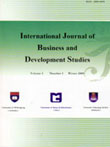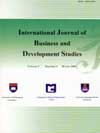فهرست مطالب

International Journal of Business and Development Studies
Volume:6 Issue: 1, Summer 2014
- تاریخ انتشار: 1393/06/26
- تعداد عناوین: 7
-
-
Pages 5-20The role of mathematics in economic analysis is not yet a settled question. Smith, Ricardo, Mill and other eminent classical economists did not use mathematics in their economic theorizations. We have defined classical mathematical economics as the whole body of literature in mathematical treatment of economics originating mainly from the contributions of Cournot, Jevons and Walras. There are a number of different explanations for the origin of classical mathematical economics suggested by different authors, which may also explain the lack of general interests among classical economists in using mathematical methods in economic analysis. This paper attempts to examine critically the views put forward by Debreu, Cournot, Walras and von Neumann and Morgenstern on the origin of mathematics in economics. Using historical evidences through direct references to their original works, we have demonstrated that none of their views are convincing. It is also shown that the tradition of classical mathematical economics did not have any significant impact on the process of economic theorization within the framework of classical economics.Keywords: Mathematical Economics, Cournot, Jevons, Walras, von Neumann, Morgenstern
-
Pages 21-38By shouldering the burden of a big chunk of global production, and giving Shelter to half of the world’s population, currently cities play an important role in national economies. Benefits of agglomeration in cities have played a major role in the process of economic development of different countries, however, the expansion of urbanization has produced some problems including environmental and noise pollutions and traffic problems. Therefore many of the Metropolitan residents blame the population growth for the problems they face while urban governors have to find an answer to the question that if there is an optimum size for their cities, what is that size? This essay reflects on the optimal and sustainable size of the metropolitans in Iran and gives separate estimation for each. Due to scarcity of statistical information this article includes five metropolitans of Tehran, Isfahan, Mashhad, Shiraz and Ahvaz, within the time span of 1999 to 2012. This survey is based on the estimation of surplus function including the pollution externalities. The results show that Tehran is overpopulated to the excess of 71 percent of its optimum size, and also it has exceeded its sustainable size by five percent. Also other four metropolitans of Isfahan, Mashhad, Shiraz and Ahvaz have exceeded their optimal size but they still are in their relevant sustainable limits.Keywords: local economy, optimal size, sustainable size, metropolises of Iran
-
Pages 39-52Empirical studies have shown that the size distribution of firms can be described as a lognormal or Pareto distribution. However, these studies have focused on developed countries and little attention has been devoted to developing countries. Using the variable of number of employees as a measure of firm size, this paper investigates the shape of firm size distribution in the food & beverages industry and also in the non-metallic mineral products industry over the period of 1997-2005. Our findings show that there is no universality of the size distribution of firms between industries. In other words, the size distribution varies in terms of kind of industry, so that our results make it clear that food & beverages industry follows lognormal distribution, conversely to other industry which a good representation of Pareto distribution. From policy point of view, knowledge about firm size distribution caused new entrance firms to decide wisely and therefore provide improvement on performance after entry.Keywords: Firm Size Distribution, Lognormal Distribution, Pareto Distribution, Manufacturing Industries, Iran
-
Pages 53-82Prior research has indicated that employee turnover is detrimental to both individuals and organisations. Because a turnover intention in the workplace is detrimental, several factors have been suggested to better understand the reasons why employees may decide to leave their organisations. Some of the organizational-related factors that have been considered by previous research include perceived organizational justice, job satisfaction, perceived psychological contract breach, and perceived organizational support, among others. Despite these empirical studies, literatures indicate that less attention has been paid to the influence of perceived organisational politics, organizational trust, and perceived human resource practices management (HRM) practices on employee turnover. Hence, the present study fills in the gap by examining the relationship between perceived organisational politics, organizational trust, perceived human resource management practices and employee turnover among Registered Nurses in Nigerian public hospitals using multiple regression analysis technique. One hundred and seventy five Registered Nurses participated in the study. Result indicated that perceived organisational politics was significantly and positively related to turnover intentions. The result also showed that both organizational trust and perceived human resource practices were significantly and negatively related to turnover intentions. Theoretical and practical implications of the results are discussed.Keywords: turnover intentions, organizational politics, organizational trust, human resource practices, Nigerian hospitals
-
Pages 83-98The machine made carpet industry is one of the main and most famous industries in Iran and especially in the city of Yazd. However there is little information about customer preferences for different attributes of this product. In this article we tried to estimate the relative importance of the main attributes affecting customer desire for purchasing machine made carpet and the utility values for the different levels of each one by means of conjoint analysis. In addition to this, we created customer segments with similar preference structures using cluster analysis. Six attributes have been considered in this paper: design, color, number of colors, density, primary material and brand. Twenty seven profiles by combining different levels of these attributes using fractional factorial design approach have been created. These profiles were evaluated by 380 customers in the city of Yazd. Results have shown that design of carpet is the most important attribute for the choice of carpet. Color, primary material, brand, density and number of colors are the next priorities for customers respectively. Also cluster analysis identified five clusters of customers with similar preferences.Keywords: Conjoint analysis, Customer's preferences, Segmentation, Machine made carpet, Yazd
-
Pages 99-112This paper aims to evaluate the impact of several indices of market structure including entry to barrier, economies of scale and concentration degree on 140 active industries using the digit. Accordingly, we apply three methods including cost disadvantages ratio (), Herfindahl–Hirschman concentration index () and Comanor and Willson criterion in order to assess the economies of scale and using the Roger''s approach for measuring the Mark up level () in the industries. Hence, in this study first we cluster 140 industries according to the neural network under a radial basis function (RBF) and then identify the mark up level by extracting the rules indicating the relationships of structural variables of the market (i.e. concentration, entry to barrier and economies of scale).Keywords: Market Structure, Fuzzy Logic, Neural Network, Markup
-
Pages 113-125According to international trade theories, countries attempt to produce and export commodities with their abundant resources. Iran has great energy resources and availability of inexpensive energy input has increased energy consumption per capita in manufacturing sector as well as in consuming sector. Relying on low energy price, manufacturers employ energy-intensive methods for producing and exporting commodities. It follows, then, that sensitivity to changes in energy price in Iran is very high. Employing panel-data model, this study seeks to investigate the intensity of the effects of changes in energy price on the export of manufacturing sector. The findings of this paper indicate that energy price and export are negatively related. Furthermore, those sectors that export a larger proportion of their GDP, due to high consumption of energy, are more sensitive to the changes in energy price.Keywords: Energy Price, Manufactured export, Panel data, Comparative Advantage


